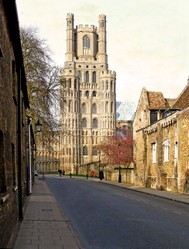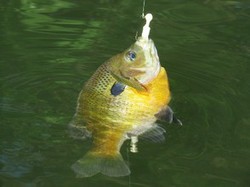Part of the race build-up was introducing the crews, women first, then men. The size of the participants, was impressive. The women were obviously the smaller of the two, but most of them were five foot nine or above and eleven stone plus of well-honed muscle. Only one was five foot seven, and she was sturdily muscled. This means that the smallest female was my height; but the male crew averaged six foot four and fourteen stone ten pounds, a very powerfully built bunch! It is my one frustration with rowing, my size! I love the sport, but at five foot seven I would never have a chance against the big men, so I contented myself with being a spectator.
The whole infrastructure was established on the Great Ouse and its banks. Portable club houses were established and a course was mapped out. This was not easy, as the fenland river has reedy banks at places, so the course had to ensure that neither boat became trapped in reedy patches. Starting positions had to be calculated exactly. We know those on the Thames from well over a hundred years experience, but the Ouse, though very straight, does have a slight bend on the course.
The race is accompanied by a flotilla of boats, of which the main one was the umpire's launch, which contains the person who is tasked with ensuring that boats do not clash oars. In addition, there are four launches provided for safety, just in case a boat sinks, as has happened on occasion. All these boats, generally moored on the Thames, had to be transported to the Ouse and kept safe and secure. An activist on one occasion disrupted the boat race, motivated by the usual delusion that somehow he was furthering his cause. This year there was no interruption or disruption.
Large pontoons had to be brought as starting blocks, from which the boats are held ready for the start, which only happens when the boats are properly positioned.
Finally feeding facilities had to be provided for the hungry crews.







 Darkness over the Earth the skies darkened when Jesus was crucified22 days ago
Darkness over the Earth the skies darkened when Jesus was crucified22 days ago
 TheThousand Year Gardenon 11/26/2025
TheThousand Year Gardenon 11/26/2025
 Women of the Gospelson 10/11/2025
Women of the Gospelson 10/11/2025
 Religious Gardenson 08/25/2025
Religious Gardenson 08/25/2025




Comments
They are well known, but we only found out on the day.
Thank you for your comment below in answer to my previous observation and question.
Are the bothersome currents of Loch Ness known or did you and Maureen learn about their existence that day?
No, I had Maureen with me, so I played it safe and went back to shore
Thank you for your comment below in answer to my previous observation and question.
My university has an outing club that includes water activities, such as boating and kayaking, on its lake. Water activities involved balmy- and bad-weather certifications.
Much as I like boating, canoeing and kayaking bad weather and their currents menace me such that I rarely move around alone in navigable waters.
Were you alone with those Loch Ness currents?
The loch has currents which change with thebtimebof day. This is due to the configuration of the deeply sloping bed and the thermal gradients associated therewith.on the northern shore it is worse as the afternoon progresses.
Me too, I agree with Veronica in her comment below about your wizzleying Loch Ness.
Your comment Apr 6, 2021, alerts us that "Rowing is one of my favourite sports. I have, though, never rowed competitively, though I have rowed for fun on lakes in England, Scotland, Ireland and Norway. This list includes Loch Ness. which was difficult to steer on because of the current where I was rowing."
Does the current affect anyone any time rowing or just at particular times and in particular places on Loch Ness?
Reference to Loch Ness opens up a entire new Wizzley article , hey favourite Big Bro ? :)
The picture is not Cambridge, it is of Ely, a small town overlooking the race course. It is of Ely Abbey, an imposing Norman edifice. I could not find a suitable small picture of Cambridge, and as I visited for work I never took pictures.
Ideally, a venue equidistant from both universities would have been chosen, but there was none suitable, and the Great Ouse is an established rowing course, so the race was held there.
frankbeswick, Thank you for practicalities and products.
Perhaps the pretty picture to the left of your title bears a street view of Cambridge, what with your personal and professional affiliations there... .
Did "the authorities" explain why they chose the venue that they did? It's a bit surprising to me that they didn't select something, for example, half-way between the two universities.
True.
Rowing is one of my favourite sports. I have, though, never rowed competitively, though I have rowed for fun on lakes in England, Scotland, Ireland and Norway. This list includes Loch Ness. which was difficult to steer on because of the current where I was rowing.